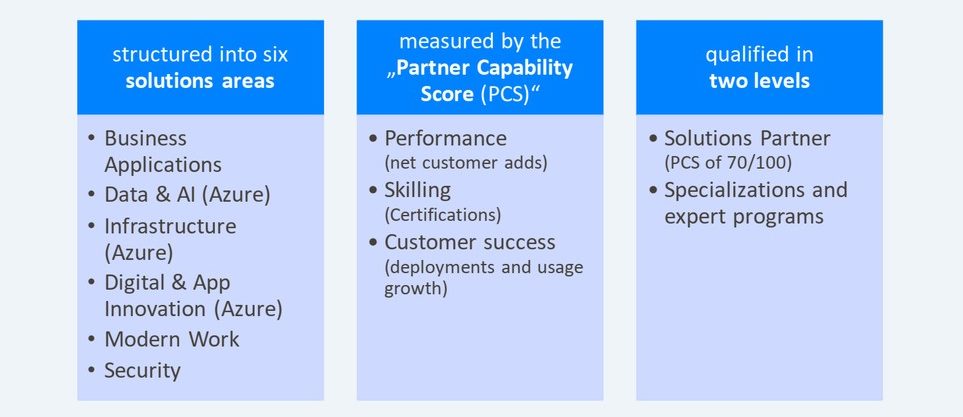Cloud
The Microsoft Cloud Partner Program Part 2
Wednesday, June 22, 2022
Reading time: 5 minutes
Updated: Monday, September 26, 2022
“Advice is a dangerous gift, even from the wise to the wise, and all paths may lead astray.
―J. R. R. Tolkien
Even if Tolkien meant in “Lord of the Rings” that advice can lead astray, I am of the opinion that a little guidance in the jungle of Microsoft programs can help you as a partner to find your way even better.
Therefore, the second part of this blog series on the Microsoft Cloud Partner Program deals with the different solution areas with which you can qualify as a partner for the “Solutions Partner” status. Today, we want to look at all 6 solution areas in more detail and see what their focus is.

Once again, as a reminder: in the new Microsoft Cloud Partner Program, there will be six solution areas in the future (instead of 18 competencies within MPN) that partners can achieve. This is measured by three criteria – the PCS Score (Partner Capability Score) and leads to two qualification levels. There is a maximum of 100 points to achieve in the PCS Score – you need a minimum of 70 points in one of the solution areas to achieve Solutions Partner status.

The six new solution areas are aligned to the Microsoft Cloud: Business Applications, Data & AI (Azure), Infrastructure (Azure), Digital & App Innovation (Azure), Modern Work  and Security. For each area, partners can earn corresponding badges that identify you as skilled in the field. If you are successful in all solution areas and earn the corresponding badges, Microsoft also offers an overall badge that recognizes your ability with the Microsoft Cloud. Let’s take a closer look at the six solution areas.
and Security. For each area, partners can earn corresponding badges that identify you as skilled in the field. If you are successful in all solution areas and earn the corresponding badges, Microsoft also offers an overall badge that recognizes your ability with the Microsoft Cloud. Let’s take a closer look at the six solution areas.
I would like to start with the Solutions Partner for Business Applications. As a Solutions Partner for Business Applications, they demonstrate their comprehensive solution delivery capabilities with Dynamics 365 and Power Platform. All workloads that deal with Dynamics 365 and Power Platform are considered here: AI Builder, Business Central, Commerce, Customer Insights, Customer Service, Customer Voice, Field Service, Finance, Fraud Protection, Marketing, Mixed Reality, Power Apps, Power Automate, Power BI Premium/Pro, Power Virtual Agent, Project Operations, Sales, Supply Chain, and Talent/HR.
The three solution areas of Solutions Partner for Data & AI, Infrastructure and Digital App & Innovation are fully aligned with Azure Services. Azure therefore has three different Solutions Partner areas with which they can show their qualification. The three solution areas of Data & AI, Digital & App Innovation and Infrastructure have common requirements and target values for the PCS “Performance” as well as “Customer Success”…. However, when it comes to the requirements for certifications (skilling), the different areas differ. Since all three solution areas are aligned to Azure, the question naturally arises as to which one you want to concentrate / focus on as a partner.
The Solutions Partner for Data & AI (Azure) could be just the right area for you as a partner if you are involved in the following activities for example:
- Design, implementation, operation and optimisation of the architecture, costs and security of customers' infrastructure (Azure).
- Migration and modernisation of customer infrastructure (Azure) for virtualised workloads (including SAP) and virtual desktop environments.
- Onboarding and management of high-performance computing workloads in Azure.
- Management, governance, security and DevOps (on-premise, cloud and multi-cloud) with Azure Arc.
The Solutions Partner for Data & AI (Azure) is to be focused on, in my view, if partner deals with the following topics:
- Analysing existing workloads, creating schema models and performing extract, transforming and loading (ETL) operations to migrate data into cloud-based data warehouses and enabling cloud-based analytics solutions.
- Designing and deploy customized Microsoft analytics solutions using Azure Synapse Analytics, Azure Data Lake, Azure Data Factory and Azure Databricks.
- Creating customer adoption of AI solutions and implementing Azure solutions for AI-powered applications and machine learning lifecycles.
In turn, if partner focuses on the following activities, they should become a Solutions Partner for Digital & App Innovation (Azure):
- Migrating and deploying production web application workloads, applying DevOps and managing app services "on-Azure".
- Managing production workloads in the cloud with containers and managing hosted Kubernetes environments "on-Azure".
- Implementing secure DevOps practices using Azure and GitHub.
It is also possible to be active in all three areas and aim for all three badges.
At this point, perhaps a concrete recommendation for action: Take a look at your points already achieved today in the Microsoft Partner Center in the overview of the solution areas. This often gives you a good indication of whether your own assessment corresponds to the figures in reality.
But now let’s move on to the last two Solutions Partner areas.
A Solutions Partner for Modern Work can demonstrate its ability by helping customers increase their productivity and move to hybrid working with Microsoft 365. In this solution area, there are two possible paths to achieve the goal: Enterprise and Small & Medium Business. Microsoft is aware that some partners target SMB customers and others target large customers. In order to offer partners more flexibility and make the goals more achievable, Microsoft evaluates both paths in this solution area and then rewards the path that is most likely to lead to status.
If you find yourself in the following points, then you should consider reaching out to Solutions Partners for Modern Work:
- Deliver, drive adoption and manage Microsoft 365 applications and services that help customers work, learn, organise, connect.
- Implement, drive adoption and manage Microsoft Teams, Microsoft Teams devices and Microsoft Teams rooms to help customers communicate and collaborate through chats, meetings and calls.
- Deliver services and solutions for Microsoft Viva to help customers leverage knowledge and expertise, foster culture and communication, accelerate skills development and growth.
As things stand today, solutions such as Intune, EXO, ProPlus, SPO, Teams, Teams Meetings, Teams Phone Calling, Teams Platform, Yammer, Exchange, Sharepoint are taken into account here.
Solutions Partners for Security may aim to provide services and solutions on Microsoft 365 workloads or on Azure services. Therefore, the assessment requirements focus on both Microsoft 365 usage and performance, as well as Azure sales revenue. The following solutions / products are considered here:
- Azure Security: Sentinel, Azure Defender, Network Security, Identity and Access Management.
- Microsoft 365: Azure Active Directory Premium, Microsoft Defender for Office 365, Microsoft Defender for Endpoints, Microsoft Defender for Identity, Microsoft Information Protection, Intune.
If these following activities describe your work, you should consider the Solutions Partner for Security status:
- Implement, manage and monitor security and compliance solutions for clients' cloud and hybrid environments.
- Plan, deploy and manage Microsoft 365 mobility and security services to keep enterprise customers secure, compliant and connected.
All in all, Microsoft offers many options to make one’s own know-how visible to the outside world by means of badges.
If you do not find yourself as a partner in any of these areas, there is no reason to panic! You still have the option of participating in the Partner Program as a “Registered Partner” or purchasing the Action Pack. According to the current state of affairs, these options will also be available to you in the future.
Update
Please note: As of September 22, 2022, Microsoft announced the introduction of an SMB track for the “Business Applications” solution area in the Microsoft Cloud Partner Program. This results in changes in the thresholds for achieving “Solution Partner” status. The original announcement from Microsoft can be found here.
Companial is here to guide you through the details, tactics, and readiness required to acquire Microsoft Solution Partner designation with our Fast Track to Microsoft Cloud Partner Program.
Na een aantal jaren voor Navision en Microsoft te hebben gewerkt, heeft Martina de Dynamics-wereld nooit echt verlaten. Sinds 2016 ondersteunt zij Dynamics partners als partner accountmanager in het Companial DACH team (voorheen QBS Group). Met haar diepgaande kennis van licenties en haar kennis van de ERP- en CRM-markt, is Martina het aanspreekpunt voor structurele problemen in de Dynamics 365-wereld.
- Microsoft Incentives - 01/08/2023
- The Microsoft Cloud Partner Program Part 6 - 02/12/2022
- The Microsoft Cloud Partner Program Part 5 - 30/11/2022